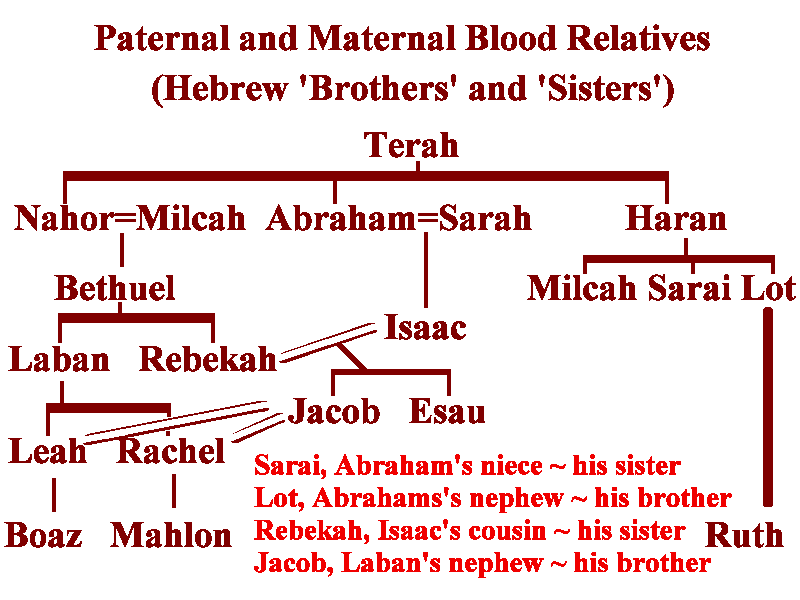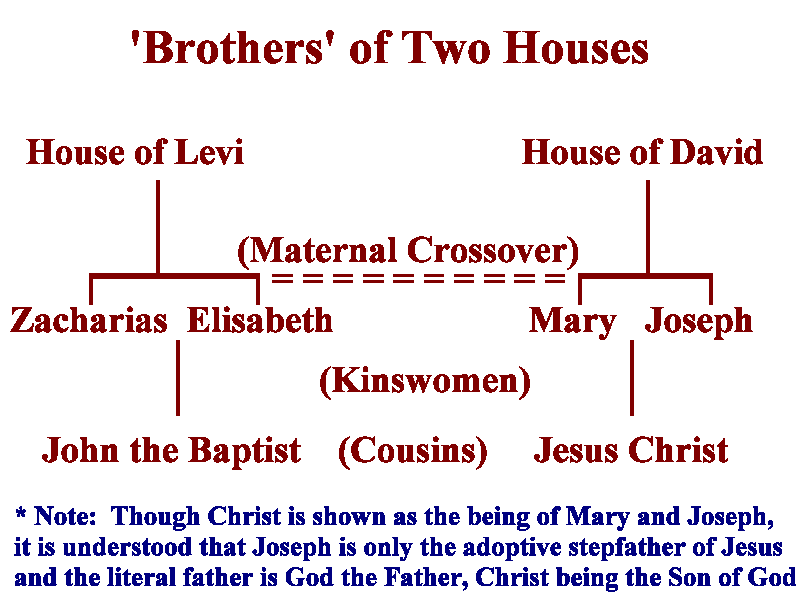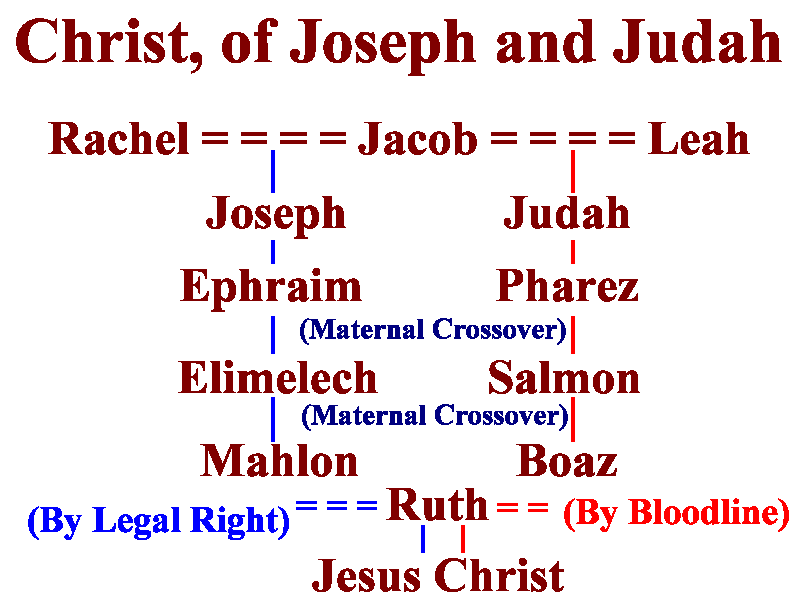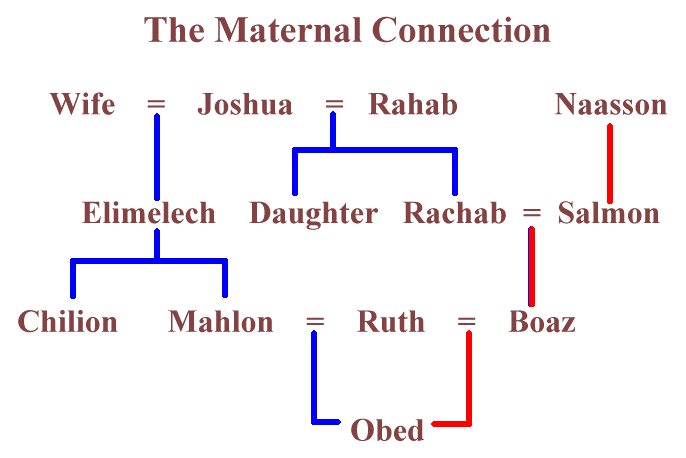In other 'Item/Chapters' of this text, it has and will be referenced that
'kinsmen' such as cousins, nephew, neices, aunts and uncles of related
families either by paternal or maternal connection may be generically
referred to as 'brother' or 'sister'. Here we will take a more detailed
look at that matter to so substantiate it completely to be the fact of the
matter withouth any real question. And while the traditional Rabbis have
forced fit that 'kinsman' in the case of Elimelech and Boaz literally meant
that they were brothers by birth, the facts just do not seem to bear that
out as Boaz was not the 'near kinsman', more closely related to Elimelech
as 'Such a One' or Almoni Ploni was Elimelech's 'nearest kinsman'. So Boaz
could well be but a 'cousin kinsman' and that would fit the scriptural
account of the book of Ruth very well.
Now in the LDS Institue Student Manuel for the Old Testament ~ Genesis - 2
Samuel, copyright 1980, page 66, it states, "Some scholars have noted that
Abraham could validly state that Sarah [Sarai daughter of Abraham's brother
Haran] was his sister. First of all, the
Hebrew words brother and sister were often used for other blood
relatives." And this was not only so in the instance of Sarah but also
between Lot and Abraham as Abraham calls his nephew Lot 'his brother' (see
Genesis 14:14 & 16). And even Laban of the house of Nahor calls Jacob of the
house of Abraham his 'brother' as quoted below.
In Moses' first book known today as Genesis, Moses sets out well what is
meant by the terms of 'brother' or 'sister'. Abraham said 'rightfully' of
his neice and wife, Sarah, that she was his 'sister' to the Egyptians and
other 'national' leaders (Abraham 2:22-25; Genesis 12:19; 20:12-16). Isaac
did the same, he stated that his 'cousin' and wife, Rebekah, was his sister
(Genesis 26:9). And so it was with Jacob and Laban, Jacob's mother's
brother. Jacob was Laban's nephrew by Rebekah, Laban's sister. Yet Laban
was not of the House of Abraham, but was the Syrian descendant of Abraham's
brother, Nahor by Bethuel, Nahor's son. Their blood relationship was a
maternal one through Rebekah. These relationships are given in the following
graphic.
This gives new definition to what some erroneously and limitingly contend,
that a 'brother' in the Law of Moses was limited to the immediate sons within
a family. Certainly the tale which the Sadducees placed before the Savior
of the dead brothers wife did seem to mean to limit within the sons of the
same family (Matthew 22:23-33; Mark 12:18-27; Luke 20:27-38). But even there
the term is modified from 'brothers' to '7 brethern' and it should be
considered in the context in which
the Old Testament is written as the Jews are of the Old Testament only. And
the book of Ruth in its 4th chapter clearly deliniates that
Boaz was performing according to the Law of Moses in raising up seed to
the dead as discussed in detail in the next item number 17.
And the New Testament can clearly be used to show that kinsmen 'brothers' in
Israel can be of different houses. The prime example being of this is that
Christ was of the House of David, the bloodline of Judah, and by legal right
of the house of Joseph, as both Mary and Joseph the carpenter where of the
House of David. But Christ's cousin John the Baptist, Mary's kinswoman
(LDS Bible dictionary under Elisabeth) Elisabeth, John's mother, and John's
fahter Zacharias, the Temple Priest, where all 'Levites'. Now Mary is
of the House of David, Judah by blood and Joseph by right, and Elisabeth is
of the House of Levi, yet they were cousins (Luke 1:36), that is closely
related to each other. Thus conceivably either one of Elisabeth's maternal
ancestors was of the House of David or one of Mary's maternal ancestors was
of the House of Levi and thus the cross over as it was in the case of Jacob
of the house of Abraham and Laban of the house of Nahor being related by way
of Rebekah, the maternal link. Further of interest here is that in all
likelihood Zacharias was a Levite Priest of the course of Abia/Abijah (Luke
1:5/1 Chronicles 24:8) a descendant Kohath who in part did live and serve
those of the house of Epharaim (Joshua 21:20), even perhaps in Ramah as did
also Samuel (1 Samuel 1:1). And thus John not only came under the age range
of those little children to be slain by Herod's order, but also according to
being of Ephraim and of Ramah in ancestry and land location as well (Jeremiah
31:15/Matthew 2:18).
This would be the likely the same type of case of the relationship of
Elimelech and Boaz. Perhaps Boaz had some Ephraimite or Ephrathite in him on
the part of a maternal ancestor, which I favor, or one of Elimelech's maternal
ancestors were of Judah. Now Boaz, as often stated in this text, the Jewish
kinsman was not the nearest kinsman but the selected kinsman who would
fulfill the Levitical duty of a kinsman by raising up seed to the House of
Mahlon, Elimelech and Naomi. As pointed out in the 4th chapter of Ruth,
'such a one' or 'Ploni Almoni' was more closely related to Elimelech, and
perhaps he being 'more closely related' could have been of Ephraim, an
Ephrathite also. But 'such a one', Ploni Almoni, or 'Tov' as he is also called
in tradition, declined the Law of Moses performance as he stated that it would 'mar' his
own inheritance, hinting that he may well have been of the same house as
Elimelech and possibly that Boaz was not. Therefore Boaz's inheritance would
not be 'marred' in the same way in which Ploni Almoni's inheritence would have
been if he performed the responsibility of redeeming kinsman. But certainly
by right, Boaz was obligated to first clear the way to the redeeming marriage
to Ruth by offering it to the more closely related kinsman of Elimemech,
Ploni Almoni (Ruth 4).
This possible relationship is now graphically shown with the probable
'maternal link' being illustrated about the generation of Elimelech. It
should be noted that various generations are left out of the diagram for
both the sake of space and the lack of specific details at this point. Also
a significant part of this diagraph should be considered in that both the
families of Rachel and Leah are represented in the offspring of Ruth. This
becomes quite significant when we turn to the community blessing received
by Ruth in the name of her promised posterity as being of both the house
of Rachel and of the house of Leah, of both Ephrath and of Bethlehem. Being
legally and rightfully of the house of Mahlon/Elimelech would entail the
'covenant birthright' come down from Jospeh/Ephraim, while also being of the
blood line of Judah by the surogate performing kinsman Boaz.
For some reason Matthew gives both the paternal and maternal ancestry of
Boaz. Why? Why bother to give both the maternal and paternal ancestry to
the one who is not the closest kinsman of Elimelech? As may be the case,
Ploni Almoni was of the same ancestry, that is of the same paternal ancestry
as Elimelch, and thus they being Ephrathites or Ephraimites. In such case
Boaz could only be related to such Ephrathites only if his maternal ancestor
was also an Ephrathite/Ephraimite. We know that Boaz's paternal ancestor is
of Judah. So did Matthew give both the paternal and maternal ancestory to
attempt to clarify that Boaz was a son of Judah by his father Salmon and that
he was related to Elimelch and the house of Ephraim by his mother named
Rachab? Some how Boaz is related to Elimelech, a near kinsman. Was he so
related the same way that Jacob and Laban were related, by such a maternal
kinship through Rebekah, Laban's sister and Isaac's wife and mother of Jacob?
What is quite significant here is that the blood of Christ was spilt by the
Jews of whose bloodline Christ is. It is the Jews who have held to the lesser
law of an eye for an eye and the blood sacrifices which they have not
understood to be representative of Jesus Christ. And in their attempt to live
the 'letter of the law' the Jews have missed understanding the work of the
atonment by which Christ through his blood does save the world from their
sins and the fall of Adam if mankind but turns their hearts unto him. But
it is not by the right of the Jews that the covenant birthright which comes
to Christ and through Christ that gospel plan. That was by right from Ephraim.
(More on that elsewhere).
By right, those covenant promises made from before the foundations of the
world and unto the fathers from Adam on down to Abraham, Isaac, Jacob, Joseph
and Epharim, does come through the birthright blessings of the firstborn,
which birthright Ephraim was given. And it is through the 'right of Ephraim'
that the promises of the fathers are fulfilled. In the meridian of time the
Jews spilt the blood of Christ and they rejected him whom they by their
blood line ancestry did give life. But it is by the right of Ephraim in and
through Christ by which the blessings of Abraham are fulfilled in Christ,
especially in these latter-days of the fulness of times. The Ensign to the
world of Christ is being unfurled before the world. By the gospel plan of the
rights, blessings and everlasting covenants of the fathers is the gospel going
forth to the whole earth both living and dead through the adoptive process of
Christ's birth into the kingdom of God represented by baptism for both the
living and the dead. It is through Ephraim that the blessings of the firstborn
and the birthright are being bestowed upon the earth. And this even by 'legal
right' of whom even Christ is, of the tribe and blessings of the eternal and
everlasting covenant from Adam to Abraham to latter-day Ephraim is the Lord's
work and glory going forth to fill the whole earth with the promised blessings
of heaven.
What Judah has rejected, Ephraim has now accepted and made it his by right,
by legal right, by the right of the covenant of the firstborn, by the right
of the promises of the fathers, and by their very right in Jesus Christ, both
as his children and as his legal and rightful covenant line from Joseph to
Ephraim to Eliemech to Mahlon to Obed to Jesse and thence on to Christ and
the latter-day sons of Ephraim who are both pure Ephraimites as well as of
the seed and root of Jesse. And the promises are fulfilled. In their
proper frame and by their rightful heirs of the covenant promises of God
and His one and only Messiah, even Jesus Christ.
¶"And Laban said unto Jacob, Because thou art my brother, shouldest
thou therefore serve me for nought? tell me, what shall thy wages be?" ~
Genesis 29:15



Possible Maternal Connection
"And Aram begat Aminadab; and Aminadab begat Naasson; and Naasson begat
Salmon; And Salmon begat Booz of Rachab; and Booz begat Obed of Ruth; and
Obed begat Jesse;" ~ Matthew 1:4-5
 One of the Jewish traditions is that the 'Innkeeper of Jericho', Rahab, did
become a wife to Joshua, but that they only had two daughters and no sons.
It has been presumed that the 'Rachab', which Matthew alludes to, was this same
women. But Boaz seems to appear too many years after for his father, Salmon,
to have married this same Rahab of Jericho who would be much too old to be
a mother to Boaz. An elderly Salmon could be father, but it would seem that
it would take a younger wife than what Rachab could have been to bear Boaz if
Rachab and Rahab were the same women. But perhaps one of the daughters of
Joshua and Rahab did take upon her, her mother's name. And perhaps this is
the maternal link. She being the Ephraimite wife to Salmon and the Ephraimite
mother to Boaz which makes Boaz related to the line of Ephraim and Elimelch,
which was to bear the promised 'SEED', even the Messiah.
One of the Jewish traditions is that the 'Innkeeper of Jericho', Rahab, did
become a wife to Joshua, but that they only had two daughters and no sons.
It has been presumed that the 'Rachab', which Matthew alludes to, was this same
women. But Boaz seems to appear too many years after for his father, Salmon,
to have married this same Rahab of Jericho who would be much too old to be
a mother to Boaz. An elderly Salmon could be father, but it would seem that
it would take a younger wife than what Rachab could have been to bear Boaz if
Rachab and Rahab were the same women. But perhaps one of the daughters of
Joshua and Rahab did take upon her, her mother's name. And perhaps this is
the maternal link. She being the Ephraimite wife to Salmon and the Ephraimite
mother to Boaz which makes Boaz related to the line of Ephraim and Elimelch,
which was to bear the promised 'SEED', even the Messiah.